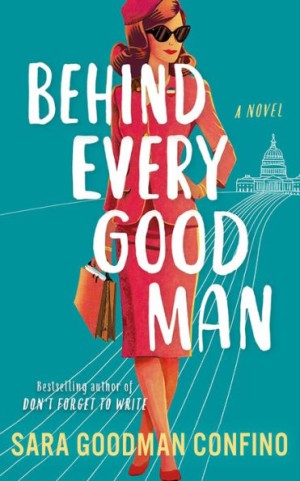Sarah Goodman Confino’s latest novel, Don’t Forget to Write, straddles worlds as well as centuries. It begins with a banishing, the result of a young woman’s brief seduction of a rabbi’s son. Following her very public embarrassment, Marilyn is given the choice of marrying the rabbi’s son or being sent to live with her great-aunt, Ada.
Marilyn is appalled by both options. There is no way she will agree to a shotgun marriage, and the only things she has heard about Ada make her out to be an unforgiving old woman. It’s 1960, and Marilyn wants to go back to college and be free of her stern father and her cowed mother, who lives under his thumb in ways Marilyn vows never to emulate, if and when she marries.
With no marriage in the offing, Marilyn is sent to Philadelphia, where Ada lives. Marilyn’s first impression of her great-aunt, beyond her wild driving home from the train station, is that she is all about rules: what Marilyn can and can’t do, and how she will be punished for doing or not doing. Even Marilyn’s lipstick is confiscated; Ada says that it makes her look like a “tart.” Marilyn envisions a long, cruel, prison-like summer.
As the story unfolds, rebellious, angry Marilyn chafes against Ada’s restrictions and does her level best to violate all of them. Ada, for her part, puts Marilyn to use recruiting eligible young men for her matchmaking business. Later, the household picks up and moves to Avalon, New Jersey for the summer, where Marilyn ups the ante, landing in a forbidden relationship with Freddy, one of the young men she recruited for Ada’s business. Discussion of romance and marriage masks the vast differences between these two young lovers, and a shocking revelation sends the relationship spiraling.
Along the way, the sarcastic repartee between Ada and Marilyn morphs into a relationship built on curiosity, compassion, and, eventually, love. Marilyn learns that Ada is a far more complex and interesting woman than she imagined. Ada’s age belies a rebellious spirit, one that has allowed her to chart a life that runs counter to the expectations placed on women of her time.
Ada imparts many lessons to Marilyn, by word and deed. Marilyn slowly reveals details of Ada’s life story, including how she came to be an unmarried matchmaker. But some secrets remain a mystery, until a surprise ending, suffused with grief, reveals the biggest secret of all.
Marilyn’s estrangement from her family is healed by the hidden hand of Ada; her love life blossoms as a result of Ada’s intervention as well. Along the way, Marilyn learns to both embrace Ada’s wisdom and emulate her exuberant, self-made life.
Nina Mogilnik left a long career in philanthropy, non-profit, and government work to focus on family, on causes dear to her, and on her own writing, which she publishes on Medium, at the Blogs of the Times of Israel, and elsewhere.




